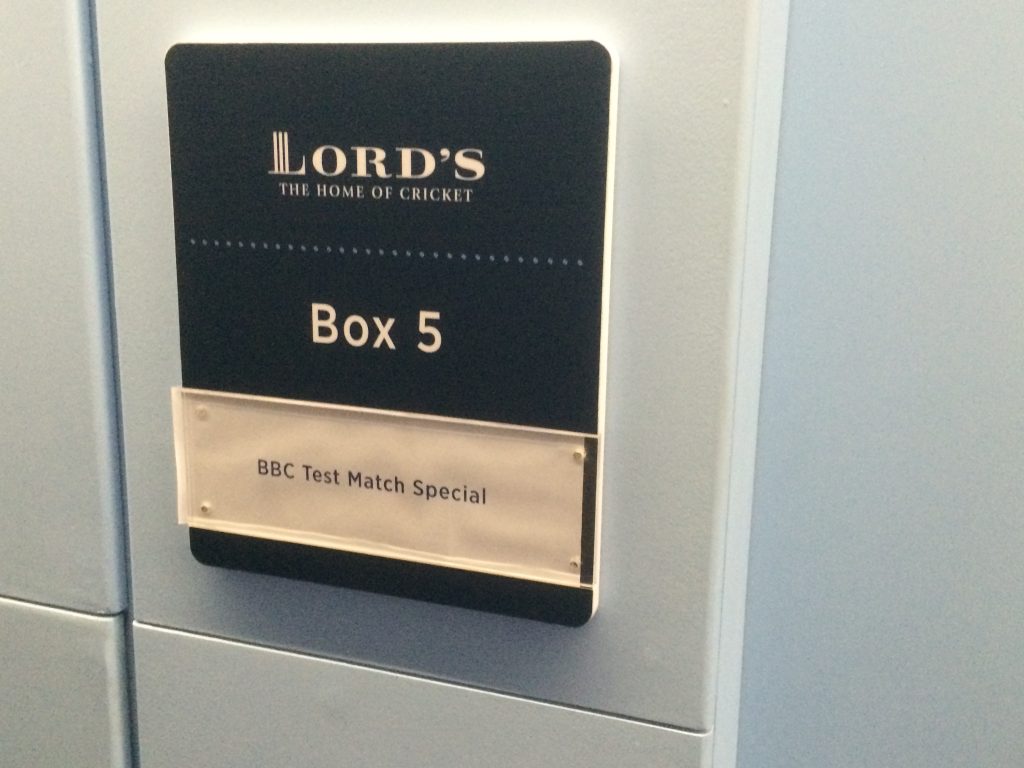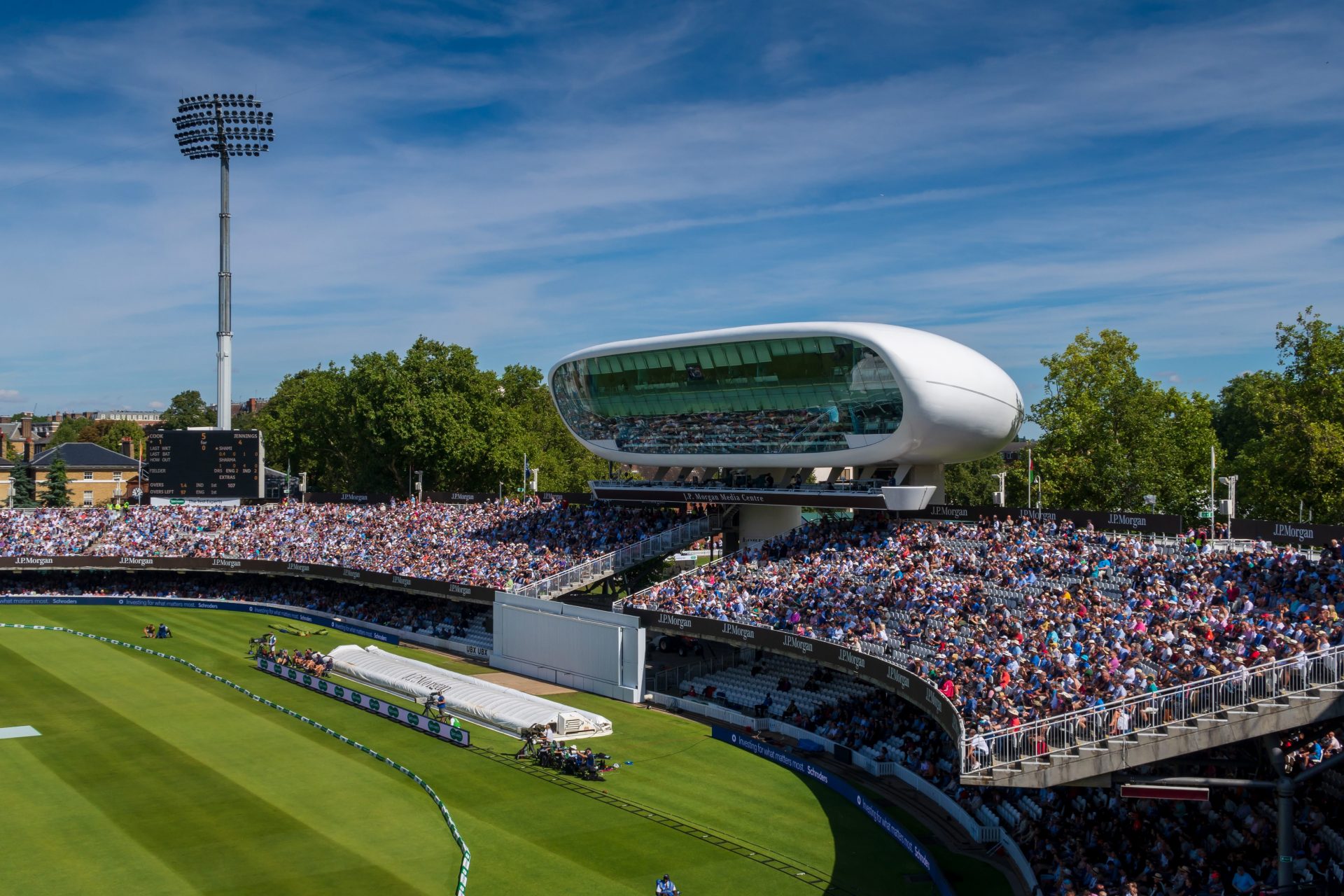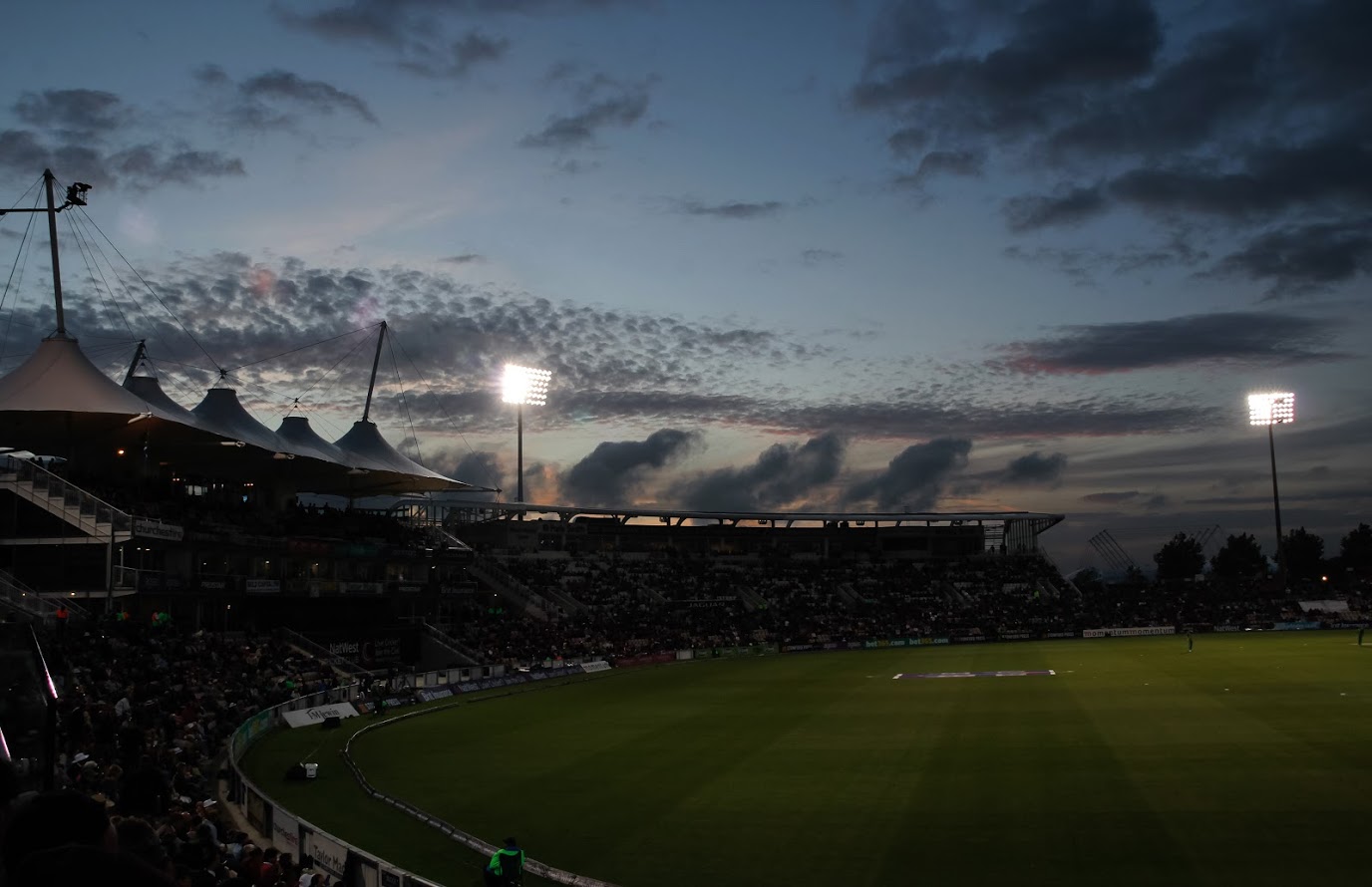Cricket commentators are a unique breed in broadcasting. They work in pairs and shifts in a game that could depending on the format last up to five days. It’s a sport that requires more explanation than most with its tactical complexity and arcane methods. Typically there is a paradox in the way cricket is presented on screen. Less is often more and plainly obvious when these particular broadcasters speak forth. The doyen of cricket commentators Richie Benaud once said ‘my mantra is: put your brain into gear and if you can add to what’s on the screen then do it, otherwise shut up. The key thing was to learn the value of economy with words and to never insult the viewer by telling them what they can already see’. It’s an absolutely seminal statement and if there was a bible for sports commentators this would be lesson one.
Benaud played the game at the very highest level and captained Australia to three Ashes wins. So he commentated from a position of authority and credibility beyond question. There was no need to fill the air with endless chatter and irrelevant stats. When Benaud spoke you listened because something important was about to happen and our viewing experience would be enhanced. The earliest commentators I can remember date me pretty accurately and it was a dynamic duo that nurtured my love of cricket. Alongside Benaud was the redoubtable Jim Laker. Like his partner Laker enjoyed a fine playing career, starring for Surrey and England in the 1950s. He famously compiled match figures of 19-90 against the Australians in 1956; a match in which Benaud played and helped strengthen the on-air chemistry.
Laker had the same economical and relaxed approach but with a more earnest delivery. He was certainly less likely to display the dry humour of Benaud. But could be heard chuckling gently in the background as a comic aside wafted over. When Sachin Tendulkar was enduring a torrid time as India’s captain, Benaud wryly observed ‘sections of the Indian media are calling for Tendulkar’s head and other parts of his anatomy I shouldn’t wonder?!’ They essentially worked in shifts with guest summarisers on hand. Former England internationals Tom Graveney and Mike Smith were always welcome contributors; as was journalist Tony Cozier who had an encyclopaedic knowledge of West Indian cricket.
Everything was pinned down and anchored by Peter West. With such reverential tones he could easily have been presenting coverage of a royal wedding. Nevertheless, his cathedral mutterings were an essential part of the broadcast. I still remember his tear stained announcement during the Headingly test of the 1975 Ashes series. It had to be abandoned when vandals took knives and oil to the pitch. Test cricket took a breather on Sundays as Jim Laker joined John Arlott to commentate on the John Player League. Arlott was as English as a cup of tea served with a Huntley & Palmer’s biscuit. His true medium was radio, and he became synonymous with the peerless Test Match Special. But it was a joy to hear the first 20 overs called by Arlott followed by Laker’s equally measured observations in the second 20 overs.
Listening to sport on radio can be a frustrating and unnerving experience. But Test Match Special led by John Arlott provided a unique perspective and was a godsend before saturating live TV took hold. It was the only way of keeping tabs on England’s overseas tours. Arlott’s penchant for poetry came to the fore as he painted vivid pictures in the listener’s mind. The incident of a streaker once sent Arlott into literary overdrive ‘we’ve got a streaker down the wicket now, not very shapely and it’s masculine. And I would think that its seen the last of its cricket for the day’.

As the 1990s dawned, the Beeb’s stranglehold on cricket was broken by Sky as they broadcast live coverage of England’s tour of the West Indies. Exclusive rights to the World Cup were later awarded to Sky, leaving the Corporation with a limited package. After 1999 the Beeb will not broadcast live cricket for another 20 years. The times they were a’ changing; Jim Laker sadly died in 1986 and Richie Benaud moved onto Channel 4 who sensationally won joint broadcasting rights with Sky. A new breed of commentator was gradually emerging. Unlike football, former players would regularly make it past the pundits couch and into the commentary box.
David Gower was an outstanding batsman who scored over 8,000 runs in 117 test matches for England. Superlatives are in short supply when describing the left hander’s playing ability, but they carried over seamlessly into a broadcasting career. With natural self-effacing charm, Gower was an instant hit. He became a captain on the hugely successful They Think It’s All Over. He also cemented his status as the new voice of cricket on Sky. He formed a memorable partnership with Ian Botham as they became the new Benaud-Laker combo that had served the BBC so well. Both former England captains, they had the benefit of being recently retired so could offer real insight.
However, they had young pretenders to their title as Gower later observed, ‘It’s the old’uns versus the young’uns, Ian and myself versus Nasser and Mike. There’s a lot of cross-generational banter as well as pure dressing room banter’. Nasser Hussain joined Sky Sports as his retirement took effect in 2004. Alongside Gower, Botham and the late Bob Willis, he became the fourth England captain to join the commentary team. Also in the mix was the irrepressible David Lloyd. Bumble was the eccentric but lovable uncle who brightened up the party. The fifth England captain to join was Mike Atherton. He quickly cut his teeth as a journalist following retirement but would make his greatest impact on TV. He signed with Sky in 2005 and became especially adroit as post-match emcee interviewing players and presenting man of the match awards
In 2019 Gower was released by Sky after the best part of 20 years heading their cricket coverage. He was typically philosophical but many were baffled by the decision. He later returned to front BT Sport’s coverage of the Ashes series in 2021-22. Alan Tyers of the Daily Telegraph welcomed the return of his ‘assured, amusing and urbane’ commentary. Ian Ward was effectively Gower’s replacement as lead presenter at Sky and has proved a likeable and able broadcaster. But with the greatest of respect I can barely remember him as a player. A solid county career mainly with Surrey was complemented by 5 test appearances in 2001. Unlike his predecessors, Ward was still a player when he first worked in the media, and has grown into a reassuring presence as both anchor and commentator
As the sport moves into an environment increasingly driven by TV money, there is a constant stream of new talent coming thorough. Ebony Rainford-Brent and Alison Mitchell represent the next wave of broadcasters who work for both Sky and Test Match Special. The latter is now 65 years old and still going strong, although Ebony and Alison don’t appear to have lost letters from their name yet; not like Aggers, Daggers and Tuffers. It’s a complicated business and we should perhaps leave the last word to John Arlott who once said ‘we take life too lightly and sport too seriously’.
Brian Penn






I’m surprised there is no mention of my favouite commentator, Jonathan Agnew. I was driving the car when he spoofed Geoff Boycott with the “Hundredth Test” co, and had to pull over!
Amazing, no mention of Holding! Benaud was his mentor and he also also practised the Benaud mantra. His use of the pregnant pause and his soft Jamaican lilt made him second only to his mentor. Arlott was another one with a perfect command of his accent and its use. A friend of mine likened listening to Arlott as enjoying “peaches with brown bread!” Most of the modern cricketers cannot get over their verbal diarrhoea, their leader in that department being the knowledgeable chatterbox, the late Shane Warne.
Are you sure Alison Mitchell is 65 years old?
42 I believe.
The doyen of cricket commentators has to be Arlott. A natural broadcaster with a command of the language beyond Benaud. The whole TMS team under him, and they were a team, entrapped even those who weren’t cricket fans to listen to their banter.
Indeed I would say I preferred Laker to Benaud, as he had a more human touch than the slightly superior air Benaud seemed to exhibit, though I am slightly prejudiced by a rather unpleasant experience I had at Benaud’s hands whilst trying to get an autograph. Laker also knew how to let the picture tell the story rather than having a fear of ‘dead air’ which produces so much of the modern day verbosity.
The modern commentators reflect a more populist delivery with plenty of hyperbole and little enlightening analysis. It shouldn’t be this way as many are ex players with you would think a deeper inside knowledge of the game. The problem is the channels they work for have an agenda to promote their coverage, however poor the standard, so any balanced assessment is unlikely.
I think the fact that they’re ex-players is often precisely the problem. If you hear palyers interviewed, they often spend much of the time coming out with the most banal, cliched rubbish–which rarely sounds remotely elegant or verbally interesting and often doesn’t sound as if their analysis is very deep.
When I was a child, it was said that the main qualification for being a commentator was using words well, not (per se) either being an ex-player or having deep knowledge. Of course–as this thread shows–there were many who were all three, but just being an ex-player doesn’t make you a good commentator. And some of the best commentators were people who had little or no professional, let alone international, playing experience. I have the impression that broadcasters have forgotten that, and that being an ex-player is now seen as a credential in itself.
I even hear this on the live streams and local radio commentary of county games. I find the local radio broadcasters generally OK (with one or two grating exceptions, hello Surrey’s main commentator!)–but when they have current players on, they usually neither talk well nor (often) offer any greater insight into the game.
The big shift in the transition to the Sky/C9 commentary model was that they were clearly expected to hype everything as great and fantastic. This had been obvious in their football commentary and spilled over into other sports.
Somewhere along the way broadcasters became strategic partners and stakeholders so the fawning left even that earlier model behind. Commentators now simply will not criticise their own governing body. Unsurprisingly, this has gone furthest in India but England really isn’t much better. Harrison could go on and speak to “Wardy” and “Aggers” without any trepidation.
…which is all another problem of the commercialisation and monetisation of absolutely everything in modern sports administration. Because in some sense they AREN’T commentators or broadcasters any longer, they’re marketers of the sport (or the country).
Agree with others on Michael Holding – even if he did break Benaud’s rule by saying what the viewer could see a little too often, he added gravitas and a much-needed neutrality to the Sky team of the last 20 years. Botham was a great player but not much of a commentator – let his own ego get in the way too much. Nasser and Athers are the best of the current generation.
On the radio, I was too young to heard Arlott live, but still have fond memories of Brian Johnston – he brought a sense of fun to the whole thing and was a much needed counter to the dour Trueman and Boycott. Isa Guha embodies the best of those spirits- of all the current TMS crop, she manages to convey the game in front of her while still getting across that it’s supposed to be fun.
I think there is a distinction to be made between ‘commentating’ and ‘commenting’, and between radio and television. Few of the worthy names here would figure at or near the top in all four combinations – Benaud would come closest with 3. The qualities required for each are different. The best commentors (for Test cricket) are, without doubt, ex players of the men’s game at the highest level, as they are the only ones with real insight who can add to the knowledge of the audience. In that regard Atherton is right up there with the best along with Benaud, Bailey, early Trueman and Boycott. (At the risk of straying into dangerous ground, the women’s game does not provide its players with that insight.) Commentors are equally adept at performing equally well between media.
Commentating is a different skill, especially radio commentary. Here the key qualities are a love of the game and an understanding of what the audience wants of you. Many of the best commentators have never played the game at the highest level, Arlott being the classic example, but that doesn’t matter as long as they can convey the atmosphere at the ground, without being over wordy,and let the listener’s imagination do the rest. Television commentary is different. It is a role in which less is often more and where silence can often speak volumes. For me, Benaud and Laker were two of the exemplars both of TV commentary and commenting.
It is interesting that no one has suggested Jonners (I agree) but I do think that the Alderman, Don Mosey merits a mention, not least for his solo efforts on tours of the sub continent.
Hey Brian,
This topic is something interesting making curiosity to read the content.
Everyone will speak to the player and their match performance.
But Nobody will no the back side of the technicians’ words.
And commentators are somehow special for broadcasting. They have to go with the flow of how they were playing. They have to concentrate on every on and everything from the ground.